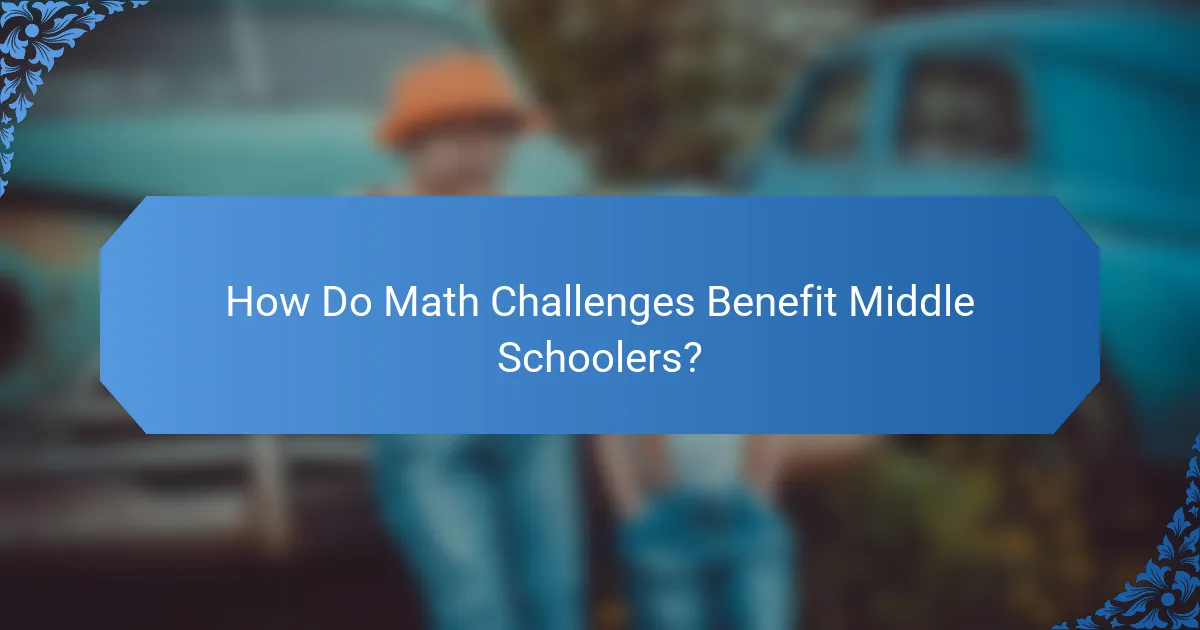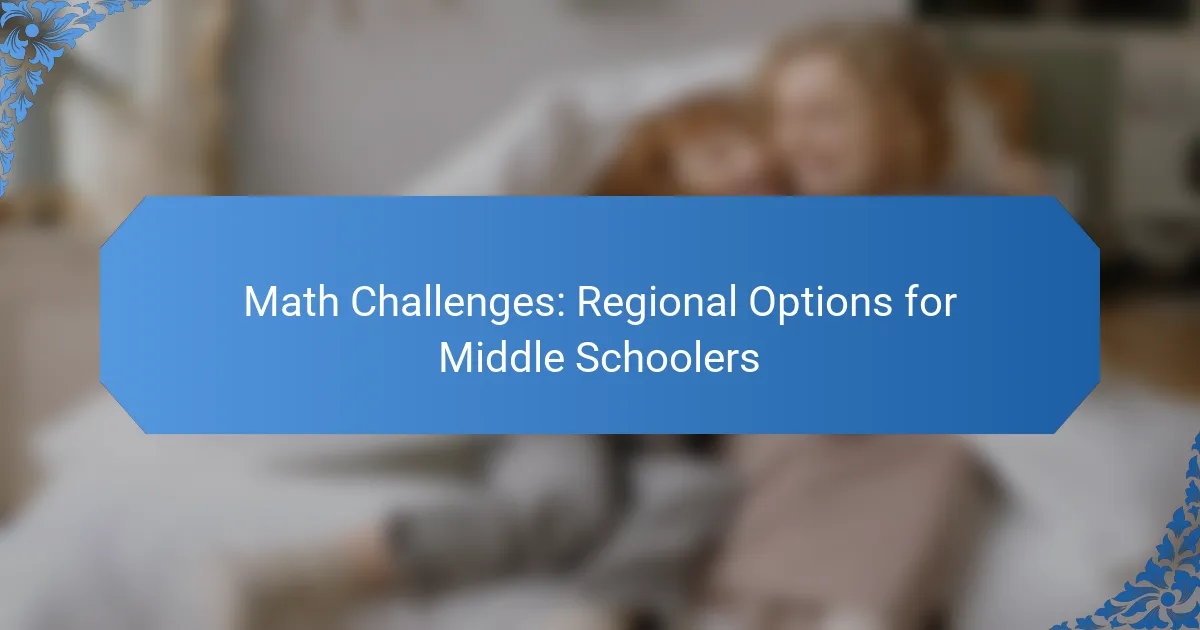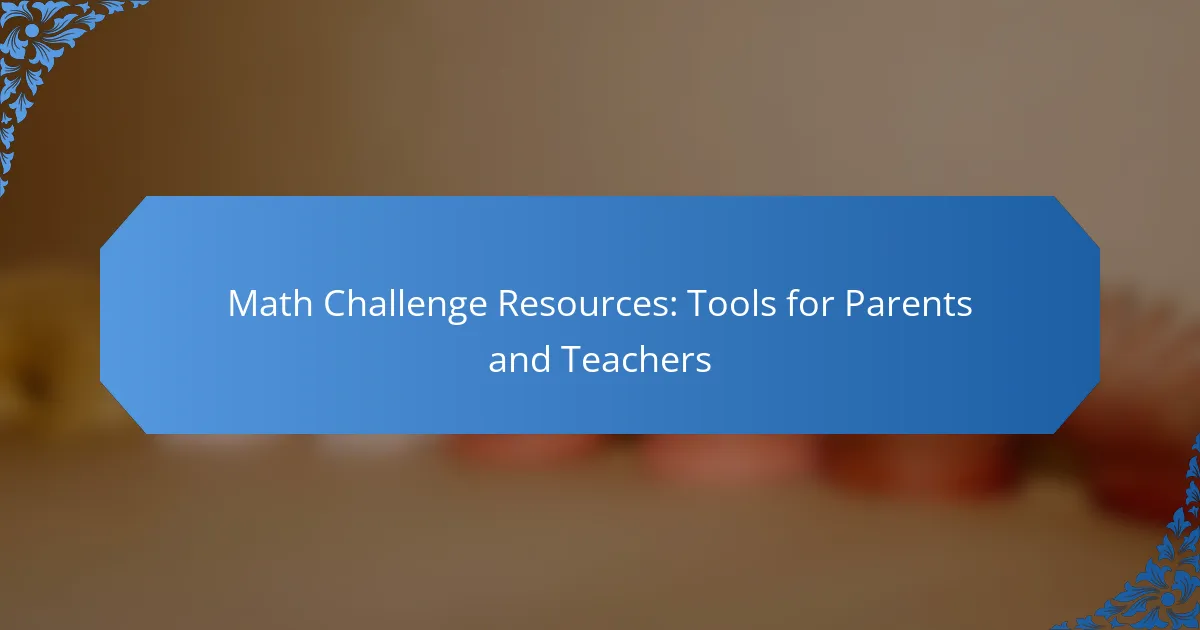Math challenges for middle schoolers across the US offer an exciting way for students to enhance their problem-solving skills and mathematical reasoning. These regional competitions not only allow students to showcase their abilities but also encourage teamwork and critical thinking in a fun, engaging environment. With various formats and difficulty levels, there is a benefit suited for every aspiring mathematician.

What Are the Best Math Challenges for Middle Schoolers in the US?
The best math challenges for middle schoolers in the US include a variety of competitions that test problem-solving skills and mathematical reasoning. These challenges provide students with opportunities to engage with math beyond the classroom, fostering critical thinking and teamwork.
Math Olympiad
The Math Olympiad is a prestigious competition that invites middle school students to solve complex problems over several rounds. Participants typically tackle five monthly contests, each consisting of challenging problems designed to enhance their mathematical abilities.
Students can prepare by practicing past Olympiad problems and participating in math clubs. This competition not only builds skills but also encourages a love for mathematics through its engaging format.
MathCounts
MathCounts is a national middle school mathematics competition that emphasizes teamwork and individual problem-solving. Schools form teams that compete in local, state, and national levels, with a focus on fun and collaboration.
Students can benefit from MathCounts by participating in weekly practices and utilizing online resources. The competition format includes both individual and team rounds, making it a versatile option for different learning styles.
AMC 8
The AMC 8 is an annual mathematics competition for middle school students, featuring 25 multiple-choice questions to be answered in 40 minutes. This competition is designed to promote problem-solving skills and mathematical reasoning among younger students.
Preparation for the AMC 8 can include reviewing past exams and engaging in math enrichment programs. Performing well can lead to further opportunities in higher-level competitions, such as the AMC 10 and AMC 12.
State Math Competitions
State math competitions vary by state but generally include individual and team events that challenge students in various mathematical areas. These competitions often serve as qualifiers for national contests, providing a pathway for talented students.
Students should check with their school or local math organizations for specific details and registration deadlines. Preparing for these events typically involves practice with previous years’ problems and collaboration with peers.
Online Math Challenges
Online math challenges offer flexible participation options for middle schoolers, allowing them to compete from home or school. Platforms like Art of Problem Solving and Brilliant provide a range of problems that cater to different skill levels.
Students can benefit from these challenges by practicing regularly and engaging with online communities for support. These platforms often feature leaderboards and rewards, adding a competitive element that can motivate students to improve their skills.

How Can Online Courses Enhance Math Skills?
Online courses can significantly enhance math skills by providing flexible learning environments and tailored resources. They offer students access to a variety of instructional methods that cater to different learning styles, making math more engaging and accessible.
Interactive Learning Platforms
Interactive learning platforms allow students to engage with math concepts through hands-on activities and real-time feedback. These platforms often include simulations, virtual manipulatives, and problem-solving exercises that encourage active participation. For example, platforms like Khan Academy and IXL provide interactive exercises that adapt to a student’s skill level.
When choosing a platform, consider its user interface and the variety of resources available. A well-designed platform can make learning more enjoyable and effective.
Personalized Feedback
Personalized feedback is crucial in online math courses as it helps students identify their strengths and weaknesses. Many online courses use algorithms to analyze student performance and provide tailored suggestions for improvement. This immediate feedback loop allows students to address misconceptions promptly.
To maximize the benefits of personalized feedback, students should actively engage with the recommendations provided. Regularly reviewing feedback can lead to significant improvements in understanding and application of math concepts.
Gamified Learning Experiences
Gamified learning experiences incorporate game elements into math education, making the process more fun and motivating. Features like points, badges, and leaderboards can encourage students to complete challenges and improve their skills. Platforms such as Prodigy Math and Mathletics use gamification to create an engaging learning atmosphere.
When utilizing gamified experiences, it’s important to balance fun with educational value. Ensure that the games are aligned with curriculum standards and effectively reinforce the math skills being taught.

What Are the Regional Math Challenge Opportunities?
Regional math challenge opportunities provide middle school students with a platform to showcase their problem-solving skills and compete against peers. These competitions vary by region, offering unique formats and levels of difficulty that cater to different skill sets.
Northeast Math Competitions
The Northeast region hosts several prestigious math competitions, including the Math Olympiad and the AMC 8. These events typically require students to solve complex problems within a limited time frame, fostering critical thinking and teamwork.
Schools often form teams to participate, and local math clubs may offer preparation sessions. Students should check eligibility requirements and registration deadlines, which can vary from year to year.
Midwest Math Events
In the Midwest, competitions like the MathCounts and the Illinois Math League are popular among middle schoolers. These events focus on individual and team problem-solving skills, with a mix of written tests and oral rounds.
Students are encouraged to practice with past papers and engage in group study sessions. It’s beneficial to familiarize oneself with the competition format, as this can greatly enhance performance.
West Coast Math Challenges
The West Coast features events such as the California Math League and the Bay Area Math Olympiad. These competitions emphasize both individual and collaborative problem-solving, often integrating technology into the challenges.
Participants should consider joining local math clubs for additional resources and mentorship. Understanding the scoring system can also help students strategize their approach during the competition.
Southern Math Tournaments
Southern states offer various math tournaments, including the Florida Math Olympiad and the Georgia Math League. These events typically focus on a range of topics, from algebra to geometry, and encourage creative problem-solving.
Students should prepare by reviewing the competition guidelines and practicing with sample problems. Engaging with peers in study groups can provide valuable insights and improve overall performance.

What Criteria Should Parents Consider When Selecting Math Challenges?
Parents should consider age appropriateness, skill level matching, and accessibility of resources when selecting math challenges for their middle schoolers. These factors ensure that the challenges are engaging, suitable, and supportive of their child’s learning journey.
Age Appropriateness
Age appropriateness is crucial in selecting math challenges, as it ensures the material is suitable for a child’s cognitive and emotional development. Challenges should align with the typical learning milestones for middle school students, generally aged 11 to 14.
For example, problems involving basic algebra and geometry are often appropriate for early middle schoolers, while more complex topics like probability and advanced algebra may be better suited for older students. Parents can look for challenges specifically designed for their child’s grade level to ensure they are neither too easy nor too difficult.
Skill Level Matching
Matching the math challenge to a child’s skill level is essential for maintaining motivation and promoting growth. Parents should assess their child’s current abilities and select challenges that provide a slight stretch beyond their comfort zone.
A good rule of thumb is to choose challenges that are about one grade level above their current math class. This approach encourages students to develop new skills without feeling overwhelmed. Regular assessments or discussions with teachers can help parents gauge their child’s readiness for more advanced challenges.
Accessibility of Resources
Accessibility of resources plays a significant role in the effectiveness of math challenges. Parents should ensure that their children have access to necessary materials, such as textbooks, online platforms, or tutoring services, to support their learning.
Many math challenges are available online, often for free or at a low cost. Parents can explore websites and apps that offer interactive problem-solving experiences. Additionally, local libraries and community centers may provide resources or workshops that can enhance a child’s learning experience.

How Do Math Challenges Benefit Middle Schoolers?
Math challenges provide middle schoolers with opportunities to enhance their mathematical abilities, fostering skills that are crucial for academic success. Engaging in these challenges can lead to improved problem-solving, critical thinking, and increased confidence in their math capabilities.
Improved Problem-Solving Skills
Participating in math challenges helps students develop strong problem-solving skills by exposing them to a variety of mathematical scenarios. These challenges often require creative approaches and the application of different strategies to arrive at solutions.
For instance, students may encounter puzzles that involve logic, patterns, or real-world applications, prompting them to think critically about how to tackle each problem. Regular practice can lead to a more systematic approach to solving complex problems.
Enhanced Critical Thinking
Math challenges encourage middle schoolers to think critically by requiring them to analyze information and make decisions based on their findings. This analytical thinking is essential not only in mathematics but also in other academic subjects and everyday situations.
Students learn to evaluate different methods for solving problems, weighing the pros and cons of each approach. This skill is transferable, allowing them to apply critical thinking in various contexts, from science projects to personal finance.
Increased Confidence in Math
Engaging in math challenges can significantly boost a student’s confidence in their mathematical abilities. As they successfully navigate through difficult problems, they gain a sense of accomplishment that reinforces their self-esteem.
To further enhance this confidence, students should be encouraged to reflect on their progress and celebrate their achievements, no matter how small. This positive reinforcement can motivate them to tackle even more challenging problems in the future.

What Are the Costs Associated with Math Challenges?
The costs associated with math challenges can vary significantly based on the type of competition, location, and level of participation. Generally, expenses may include registration fees, travel costs, and materials needed for preparation.
Registration Fees
Registration fees for math challenges can range from modest amounts to several hundred dollars, depending on the competition’s prestige and scale. Local competitions may charge lower fees, often between $10 to $50, while national or international events can exceed $200.
It’s essential to check the specific event’s website for detailed fee structures and any potential discounts for early registration or group entries.
Travel Expenses
Travel expenses can add up quickly, especially if the math challenge is held in a different city or country. Consider costs for transportation, accommodation, and meals, which can vary widely based on distance and location.
For regional competitions, families might spend a few hundred dollars, while national events could lead to expenses in the low thousands. Budgeting for these costs ahead of time can help manage financial expectations.
Preparation Materials
Preparation for math challenges often requires purchasing study materials, such as textbooks, workbooks, or online courses. These resources can cost anywhere from $20 to several hundred dollars, depending on the depth and breadth of the material.
Utilizing free online resources or community programs can help offset these costs. Additionally, forming study groups can provide support and reduce the need for extensive individual purchases.



